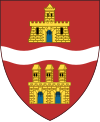Portal:EU
Portal:European Union
The European Union (EU) is a supranational political and economic union of 27 member states that are located primarily in Europe. The Union has a total area of 4,233,255 km2 (1,634,469 sq mi) and an estimated total population of over 448 million. The EU has often been described as a sui generis political entity (without precedent or comparison) combining the characteristics of both a federation and a confederation. Containing 5.8% of the world population in 2020, EU member states generated a nominal gross domestic product (GDP) of around US$16.6 trillion in 2022, constituting approximately one sixth of global nominal GDP. Additionally, all EU states except Bulgaria have a very high Human Development Index according to the United Nations Development Programme. Its cornerstone, the Customs Union, paved the way to establishing an internal single market based on standardised legal framework and legislation that applies in all member states in those matters, and only those matters, where the states have agreed to act as one. EU policies aim to ensure the free movement of people, goods, services and capital within the internal market; enact legislation in justice and home affairs; and maintain common policies on trade, agriculture, fisheries and regional development. Passport controls have been abolished for travel within the Schengen Area. The eurozone is a group composed of the 20 EU member states that have fully implemented the economic and monetary union and use the euro currency. Through the Common Foreign and Security Policy, the union has developed a role in external relations and defence. It maintains permanent diplomatic missions throughout the world and represents itself at the United Nations, the World Trade Organization, the G7 and the G20. Due to its global influence, the European Union has been described by some scholars as an emerging superpower. In 2012, the EU was awarded the Nobel Peace Prize. The United Kingdom became the only member state to leave the EU, in 2020; ten countries are aspiring or negotiating to join it. (Full article...)  The Treaty of Lisbon or Lisbon Treaty (initially known as the Reform Treaty) is an international agreement which amends the two treaties which form the constitutional basis of the European Union (EU). The Lisbon Treaty was signed by the EU member states on 13 December 2007, and entered into force on 1 December 2009. It amends the Maastricht Treaty (also known as the Treaty on European Union) and the Treaty establishing the European Community (TEC; also known as the Treaty of Rome). In this process, the Rome Treaty was renamed to the Treaty on the Functioning of the European Union (TFEU). Prominent changes included the move from unanimity to qualified majority voting in several policy areas in the Council of Ministers, a change in calculating such a majority to a new double majority, a more powerful European Parliament forming a bicameral legislature alongside the Council of ministers under the ordinary legislative procedure, a consolidated legal personality for the EU and the creation of a long-term President of the European Council and a High Representative of the Union for Foreign Affairs and Security Policy. The Treaty also made the Union's bill of rights, the Charter of Fundamental Rights, legally binding. Photograph credit: Georgios Giannopoulos The European migrant crisis, also known as the refugee crisis, is a period beginning in 2015 characterised by high numbers of people arriving in the European Union from across the Mediterranean Sea or overland through Southeast Europe following Turkey's migrant crisis. It is part of a pattern of increased immigration to Europe from other continents, which began in the mid-20th century and which has encountered resistance in many European countries.
This picture shows Syrian and Iraqi refugees disembarking a boat upon reaching the coastal waters of the island of Lesbos, Greece, after having crossed the Mytilini Strait from Turkey. They are being assisted by volunteer lifeguards, in yellow and red clothes, from Proactiva Open Arms, a Spanish non-governmental organisation.
...that "Nocturne" is the Eurovision Song Contest winner with the fewest words, the Norwegian language original having only 25?  ...that the Eastgate Clock (pictured) in Chester is the second most photographed timepiece in the United Kingdom, after Big Ben? ...that "Kinek mondjam el vétkeimet?" received three perfect scores at the start of voting in the Eurovision Song Contest 1994 before ultimately coming in fourth, making Hungary the only debuting nation to lead the voting? Budapest is the capital city of Hungary and the country's principal political, cultural, commercial, industrial and transportation center. Budapest has approximately 1.7 million inhabitants, down from a mid-1980s peak of 2.1 million. Budapest became a single city occupying both banks of the river Danube with the amalgamation on 17 November 1873 of right-bank Buda together with Pest on the left bank. It is the ninth largest city in the European Union. Budapest's recorded history begins with the Roman town of Aquincum, founded around AD 89 on the site of an earlier Celtic settlement near what was to become Óbuda, and from 106 until the end of the 4th century the capital of the province of lower Pannonia. The Hungarians led by Árpád settled in the territory at the end of the 9th century, and a century later officially founded the Kingdom of Hungary. Research places the probable residence of the Árpáds an early place of central power near what became Budapest. The Tatar invasion in the 13th century quickly proved that defence is difficult on a plain. King Béla IV of Hungary therefore ordered the construction of reinforced stone walls around the towns and set his own royal palace on the top of the protecting hills of Buda. In 1361 it became the capital of Hungary. The following are images from various European Union-related articles on Wikipedia.
The following Wikimedia Foundation sister projects provide more on this subject:
Discover Wikipedia using portals |































































